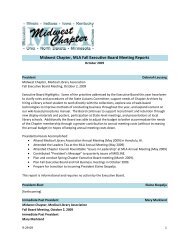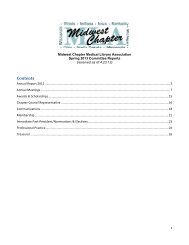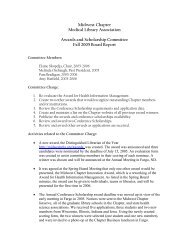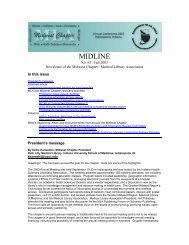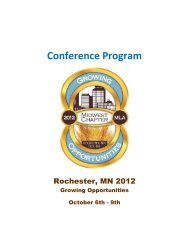the final program updated September 2. - Midwest Chapter MLA
the final program updated September 2. - Midwest Chapter MLA
the final program updated September 2. - Midwest Chapter MLA
Create successful ePaper yourself
Turn your PDF publications into a flip-book with our unique Google optimized e-Paper software.
Posters Routes to Discovery 2005<br />
regional libraries. Fourteen volunteer librarians from HSLM worked for six months developing <strong>the</strong> content for<br />
consumer health workshops and took <strong>the</strong> <strong>program</strong> on <strong>the</strong> road. The Minnesota Library Association annual meeting<br />
in Duluth in <strong>September</strong> 2004 provided ano<strong>the</strong>r training opportunity, where an additional 30 multi-type librarians<br />
were introduced to <strong>the</strong> available consumer health resources. Two o<strong>the</strong>r parallel training <strong>program</strong>s were developed<br />
and implemented under this grant. One <strong>program</strong>, sponsored by <strong>the</strong> Resource Center of <strong>the</strong> Americas in<br />
Minneapolis, focused on Hispanic health science literature; and <strong>the</strong> o<strong>the</strong>r <strong>program</strong>, presented by <strong>the</strong> Minnesota<br />
Association of Law Librarians (MALL), focused on legal resources for <strong>the</strong> general public.<br />
5. Reaching Out with Banned Books<br />
Linda E. Bunyan, Medical Library Services/Bookstore, Summa Health System, Akron, OH<br />
Members of a worksite book discussion group, sponsored by <strong>the</strong> medical library, read books listed in 100 Banned<br />
Books: Censorship Histories of World Literature. The list includes books of all genres that have been banned on<br />
political, social, sexual, or religious grounds. The project attracts employees who do not o<strong>the</strong>rwise use <strong>the</strong> library<br />
and generates publicity via <strong>the</strong> employee newsletter and poster.<br />
6. Blazing a Trail to Information Management: RefWorks and EndNote Collaboration<br />
Ann M. Combs, Michael W. Venner & Gerri Wanserski, Ebling Library, University of Wisconsin-Madison<br />
Life-long learning is a goal everyone subscribes to. We are adding to it <strong>the</strong> pursuit of life-long information<br />
management. This poster outlines a collaborative, multi-faceted approach led by Ebling and o<strong>the</strong>r campus libraries<br />
to prepare for and support <strong>the</strong> campus use of two bibliographic management systems: EndNote and RefWorks.<br />
Differences will be pointed out between RefWorks, which is free to affiliated users, and <strong>the</strong> more powerful EndNote,<br />
which must be purchased by <strong>the</strong> user.<br />
7. Creating Tutorials for Online Learning<br />
Ulrike Dieterle, Ebling Library, University of Wisconsin-Madison<br />
During <strong>the</strong> 2004-05 academic year, School of Nursing clinical instructors and librarians at <strong>the</strong> University of<br />
Wisconsin-Madison combined <strong>the</strong>ir creative energies to produce four online library tutorials. This presentation will<br />
illustrate: (1) project objectives; (2) how <strong>the</strong> group planned, developed, and implemented online learning objects;<br />
(3) lessons learned from experiences and assessments; and (4) implications for future projects and collaborations.<br />
8. Trial by Fire: Multi-Type Collaboration on a Regional Conference<br />
Karen Douglas, Sibert Library, Passavant Area Hospital, Jacksonville, IL<br />
Lynne Ferrell, Kenneth Schnepp Library, Memorial Medical Center, Springfield, IL<br />
Nina Pals, Sara Bush Lincoln Health Center Library, Mattoon, IL<br />
Rhona Kelley, Sou<strong>the</strong>rn Illinois University School of Medicine Library, Springfield, IL<br />
Michelle Quinones, Graham Hospital Library, Canton, IL<br />
In 2002 <strong>the</strong> HSLI (Health Science Librarians of Illinois) began planning for <strong>the</strong> 2004 conference of <strong>the</strong> <strong>Midwest</strong><br />
<strong>Chapter</strong>/<strong>MLA</strong>. HSLI follows an “upstate-downstate” pattern for state conference planning. It was decided that this<br />
regional conference would be planned downstate since <strong>the</strong> last <strong>Midwest</strong> <strong>Chapter</strong> conference hosted by HSLI was<br />
held in Rockford. The three downstate consortiums, along with <strong>the</strong> Sou<strong>the</strong>rn Illinois University School of Medicine,<br />
began negotiations to co-host <strong>the</strong> conference on behalf of HSLI. Representatives to <strong>the</strong> planning group came from<br />
a variety of backgrounds. Large and small academic libraries were represented, as well as hospital libraries and a<br />
smattering of special interest libraries. The process became a veritable “trial by fire”, as many of <strong>the</strong> participants<br />
had never planned a conference before, much less a conference with representatives from nine states. The 2004<br />
<strong>Midwest</strong> <strong>Chapter</strong>/<strong>MLA</strong> planning committee survived <strong>the</strong> test, hosted a successful and enjoyable conference, and<br />
hopes to share <strong>the</strong>ir thoughts and ideas for all who endeavor to undertake a task of this magnitude.



